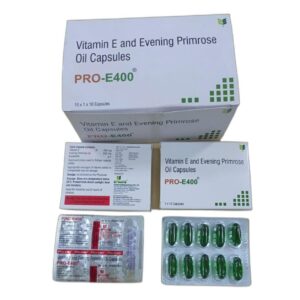VITAMIN E + PRIMROSE OIL
Vitamin E: Vitamin E, also known as alpha-tocopherol, is an essential nutrient that acts as an antioxidant in the body. It plays a crucial role in protecting cells from damage caused by free radicals, which are highly reactive molecules that can harm cells and tissues.
The primary use of vitamin E supplements is to treat vitamin E deficiency, which is rare but can occur in individuals with certain conditions such as cystic fibrosis, Crohn’s disease, or liver disease. Vitamin E supplements may also be used to manage certain neurological conditions like tardive dyskinesia and Alzheimer’s disease, although further research is needed to confirm their effectiveness in these areas.
The mechanism of action of vitamin E is primarily related to its antioxidant properties. It works by neutralizing free radicals, thereby preventing them from causing oxidative damage to cells and tissues. As an antioxidant, vitamin E also helps protect against inflammation, blood clotting, and cell proliferation.
The recommended daily dose of vitamin E varies depending on age, sex, and other factors. For adults, the recommended daily allowance is 15 mg (22.4 IU) per day. However, higher doses are commonly used in the treatment of specific conditions and can range from 200 to 800 IU per day.
While vitamin E is generally considered safe, high doses above the recommended dietary allowance can increase the risk of bleeding, especially in individuals taking blood-thinning medications. Other possible side effects include nausea, diarrhea, stomach cramps, fatigue, and weakness.
It’s important to note that obtaining vitamin E through a well-balanced diet is usually sufficient for meeting daily requirements. Good sources of vitamin E include nuts, seeds, vegetable oils, spinach, and broccoli. If considering vitamin E supplementation, it’s advisable to consult with a healthcare professional to determine the appropriate dose and to discuss any potential risks or interactions.
Primrose Oil: Primrose Oil is a natural supplement derived from the seeds of the evening primrose plant. It is commonly used for its potential health benefits, particularly for conditions related to inflammation, hormonal imbalance, and skin health.
The main active component in Primrose Oil is gamma-linolenic acid (GLA), which is an omega-6 fatty acid. GLA plays a crucial role in the production of prostaglandins, which are hormone-like substances that regulate various bodily functions, including inflammation and blood clotting.
Primrose Oil is primarily used to alleviate symptoms associated with premenstrual syndrome (PMS) and menopause. It may help reduce breast pain, bloating, irritability, and mood swings associated with these conditions. Additionally, it is sometimes used to manage eczema, acne, and other skin disorders due to its potential anti-inflammatory properties.
The recommended dose of Primrose Oil varies depending on the condition being treated. For PMS, the typical dosage ranges from 500 to 2,000 milligrams per day, divided into multiple doses. For skin conditions, the daily dose ranges from 500 to 3,000 milligrams. It is important to follow the specific instructions provided by the healthcare provider or the product label.
Some common side effects of Primrose Oil include headache, stomach upset, nausea, and loose stools. In rare cases, it may cause allergic reactions such as rash, itching, or swelling. People with a history of seizure disorders or bleeding disorders should use Primrose Oil with caution, as it may increase the risk of seizures or bleeding. It is advised to consult with a healthcare professional before starting to take Primrose Oil, especially if you are on any medications or have any underlying health conditions.
While Primrose Oil is generally considered safe for short-term use, long-term safety and effectiveness have not been completely established. Therefore, it is always advisable to consult with a healthcare professional before incorporating any new supplement into your routine.

